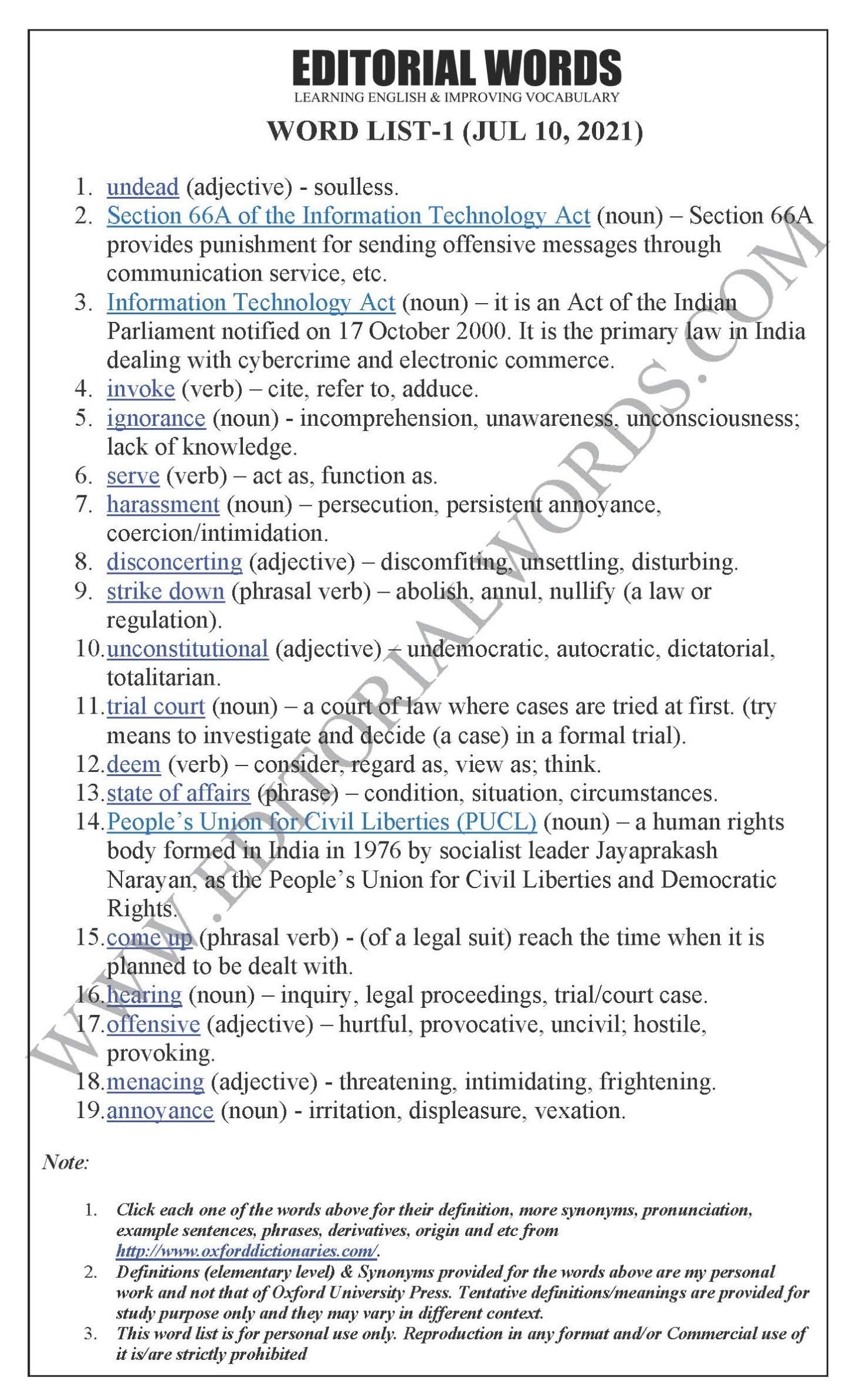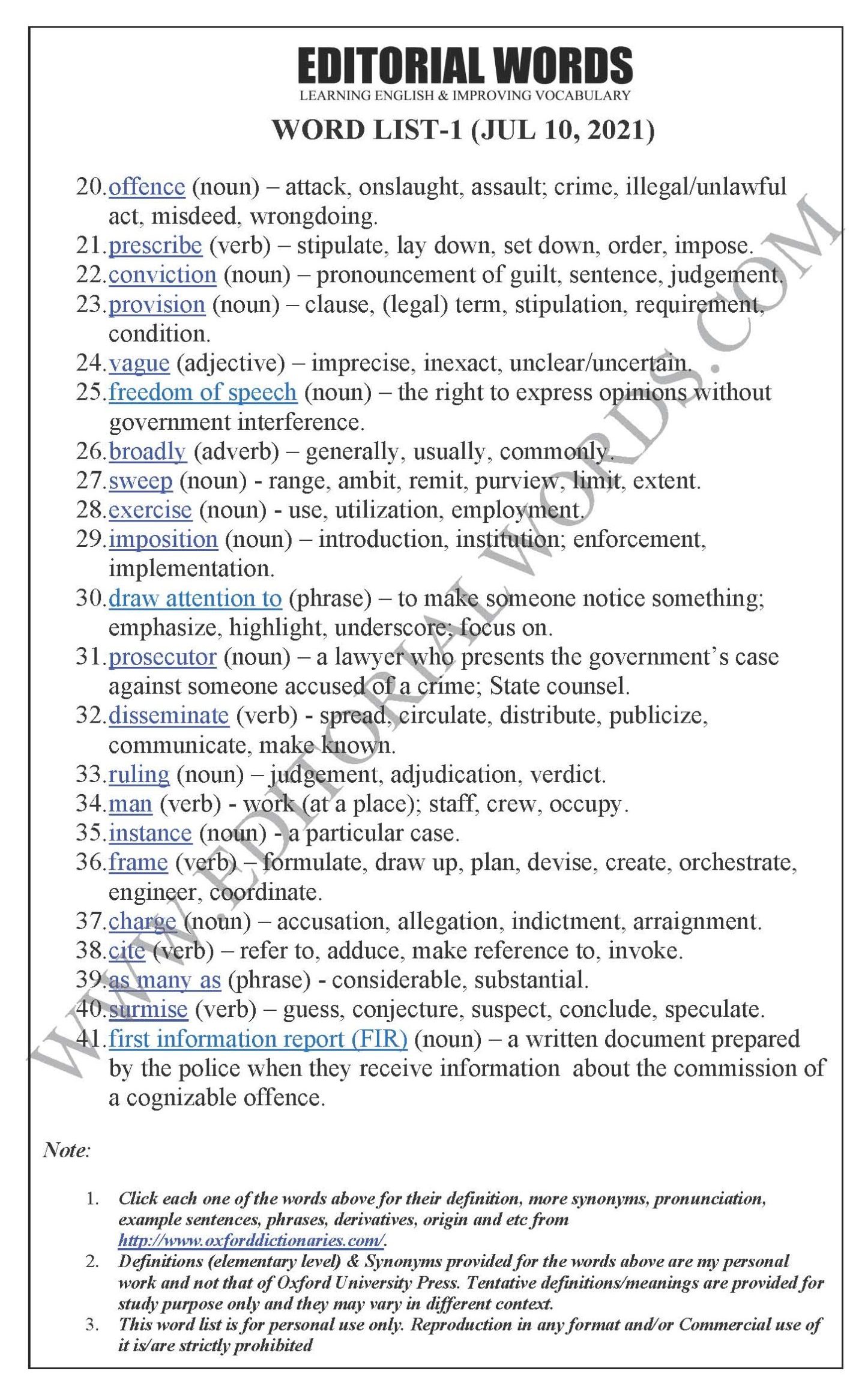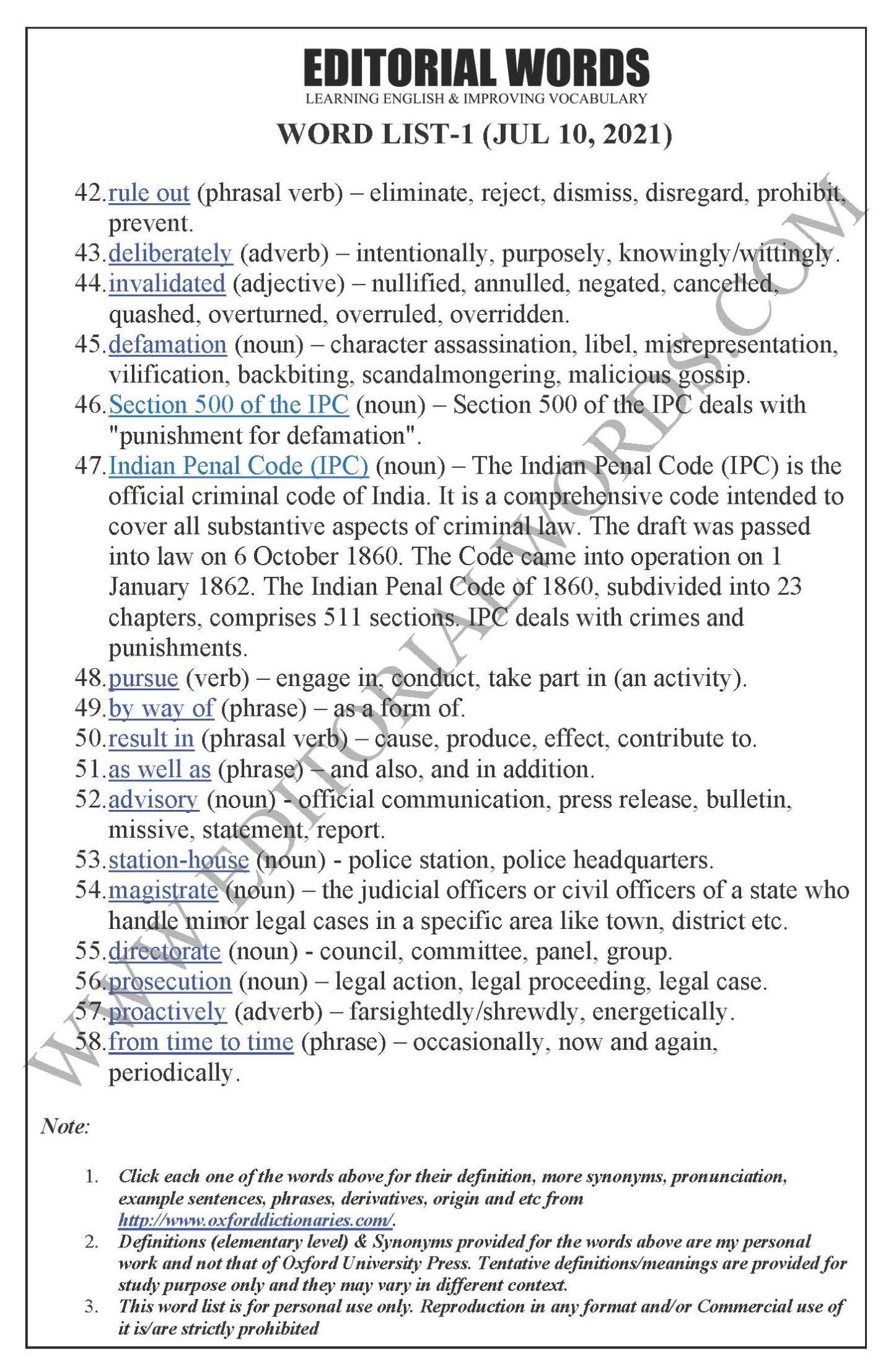The Hindu Editorial (Undead section) – Jul 10, 2021
It is quite disconcerting that the Supreme Court has been informed for the second time in two years that Section 66A of the IT Act, which was struck down… For further reading, visit “The Hindu”. Below is today’s word list-1 for The Hindu Editorial (Undead section) – Jul 10, 2021.
To read this article, click here.
This preview is provided here with permission.
Courtesy: The Hindu
The Hindu Editorial (Undead section) – Jul 10, 2021:
- undead (adjective) – soulless.
- Section 66A of the Information Technology Act (noun) – Section 66A provides punishment for sending offensive messages through communication service, etc.
- Information Technology Act (noun) – it is an Act of the Indian Parliament notified on 17 October 2000. It is the primary law in India dealing with cybercrime and electronic commerce.
- invoke (verb) – cite, refer to, adduce.
- ignorance (noun) – incomprehension, unawareness, unconsciousness; lack of knowledge.
- serve (verb) – act as, function as.
- harassment (noun) – persecution, persistent annoyance, coercion/intimidation.
- disconcerting (adjective) – discomfiting, unsettling, disturbing.
- strike down (phrasal verb) – abolish, annul, nullify (a law or regulation).
- unconstitutional (adjective) – undemocratic, autocratic, dictatorial, totalitarian.
- trial court (noun) – a court of law where cases are tried at first. (try means to investigate and decide (a case) in a formal trial).
- deem (verb) – consider, regard as, view as; think.
- state of affairs (phrase) – condition, situation, circumstances.
- People’s Union for Civil Liberties (PUCL) (noun) – a human rights body formed in India in 1976 by socialist leader Jayaprakash Narayan, as the People’s Union for Civil Liberties and Democratic Rights.
- come up (phrasal verb) – (of a legal suit) reach the time when it is planned to be dealt with.
- hearing (noun) – inquiry, legal proceedings, trial/court case.
- offensive (adjective) – hurtful, provocative, uncivil; hostile, provoking.
- menacing (adjective) – threatening, intimidating, frightening.
- annoyance (noun) – irritation, displeasure, vexation.
- offence (noun) – attack, onslaught, assault; crime, illegal/unlawful act, misdeed, wrongdoing.
- prescribe (verb) – stipulate, lay down, set down, order, impose.
- conviction (noun) – pronouncement of guilt, sentence, judgement.
- provision (noun) – clause, (legal) term, stipulation, requirement, condition.
- vague (adjective) – imprecise, inexact, unclear/uncertain.
- freedom of speech (noun) – the right to express opinions without government interference.
- broadly (adverb) – generally, usually, commonly.
- sweep (noun) – range, ambit, remit, purview, limit, extent.
- exercise (noun) – use, utilization, employment.
- imposition (noun) – introduction, institution; enforcement, implementation.
- draw attention to (phrase) – to make someone notice something; emphasize, highlight, underscore; focus on.
- prosecutor (noun) – a lawyer who presents the government’s case against someone accused of a crime; State counsel.
- disseminate (verb) – spread, circulate, distribute, publicize, communicate, make known.
- ruling (noun) – judgement, adjudication, verdict.
- man (verb) – work (at a place); staff, crew, occupy.
- instance (noun) – a particular case.
- frame (verb) – formulate, draw up, plan, devise, create, orchestrate, engineer, coordinate.
- charge (noun) – accusation, allegation, indictment, arraignment.
- cite (verb) – refer to, adduce, make reference to, invoke.
- as many as (phrase) – considerable, substantial.
- surmise (verb) – guess, conjecture, suspect, conclude, speculate.
- first information report (FIR) (noun) – a written document prepared by the police when they receive information about the commission of a cognizable offence.
- rule out (phrasal verb) – eliminate, reject, dismiss, disregard, prohibit, prevent.
- deliberately (adverb) – intentionally, purposely, knowingly/wittingly.
- invalidated (adjective) – nullified, annulled, negated, cancelled, quashed, overturned, overruled, overridden.
- defamation (noun) – character assassination, libel, misrepresentation, vilification, backbiting, scandalmongering, malicious gossip.
- Section 500 of the IPC (noun) – Section 500 of the IPC deals with “punishment for defamation”.
- Indian Penal Code (IPC) (noun) – The Indian Penal Code (IPC) is the official criminal code of India. It is a comprehensive code intended to cover all substantive aspects of criminal law. The draft was passed into law on 6 October 1860. The Code came into operation on 1 January 1862. The Indian Penal Code of 1860, subdivided into 23 chapters, comprises 511 sections. IPC deals with crimes and punishments.
- pursue (verb) – engage in, conduct, take part in (an activity).
- by way of (phrase) – as a form of.
- result in (phrasal verb) – cause, produce, effect, contribute to.
- as well as (phrase) – and also, and in addition.
- advisory (noun) – official communication, press release, bulletin, missive, statement, report.
- station-house (noun) – police station, police headquarters.
- magistrate (noun) – the judicial officers or civil officers of a state who handle minor legal cases in a specific area like town, district etc.
- directorate (noun) – council, committee, panel, group.
- prosecution (noun) – legal action, legal proceeding, legal case.
- proactively (adverb) – farsightedly/shrewdly, energetically.
- from time to time (phrase) – occasionally, now and again, periodically.
Note:
1. Click each one of the words above for their definition, more synonyms, pronunciation, example sentences, phrases, derivatives, origin and etc from http://www.oxforddictionaries.com/.
2. Definitions (elementary level) & Synonyms provided for the words above are my personal work and not that of Oxford University Press. Tentative definitions/meanings are provided for study purpose only and they may vary in a different context.
3. This word list is for personal use only. Reproduction in any format and/or Commercial use of it is/are strictly prohibited.
The Hindu Editorial (Undead section) – Jul 10, 2021:



“Phrasal Verbs” We Learnt Last Week
“Idioms & Phrases” We Learnt Last Week
“Important Definitions” We Learnt Last Week
Recent Word Lists For The Hindu Editorial Articles

Be the first to comment